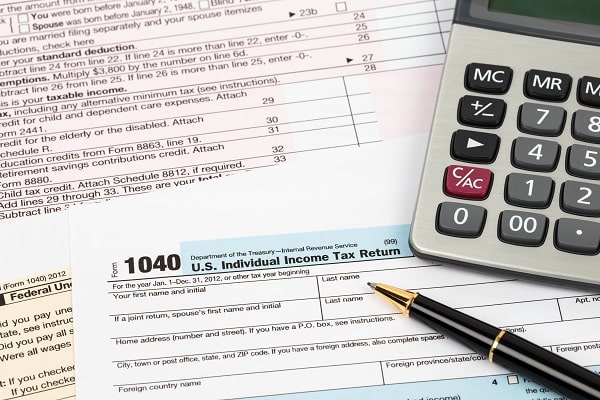While tax scams can take place at any point during the year, they tend to spike during tax season. Additionally, after a decrease in scams for a few years, the IRS reported that there was a surge of
tax-related scam incidents, with more than 2,000 incidents reported from January through October.
Tax season presents the perfect opportunity for scammers to take advantage of hard-working individuals and small businesses through phishing scams, malware attacks, vishing (phone) scams and more. Every year, the IRS prepares a list of 12 tax-related scams they call “
The Dirty Dozen” highlighting one scam a day in the hopes of helping individuals avoid falling victim to one during the busy tax season.
Tax Scams to Avoid This Filing Season

It’s important that your small business insureds are well-informed about the types of tax scams that can occur throughout the year to ensure their sensitive information remains protected. Because these scams can not only lead to identity theft but also significant penalties and even criminal prosecution, being informed is the first defense in avoiding falling victim to a tax-related scam.
Here is an overview of a few of the top tax scams the IRS has identified:
Creative, new phishing scams
Phishing scams are at the top of the IRS’s Dirty Dozen list, as scammers are getting clever when it comes to tricking taxpayers via legitimate looking emails designed to steal personal information. This year, con artists are going as far as to file fraudulent returns and direct deposit them into victims’ bank accounts, then later send an email declaring they’re a collection agency or the IRS and need to reclaim the deposited funds.
Phone scams
Phone scams, also known as vishing (voice phishing) scams, continue to be a major threat during tax season. As people gear up to file their taxes, the IRS reports an increase in fake phone calls or voicemails from criminals posing as the IRS. These scammers may have some personal information, such as the last four digits of the victim’s social security number, to scare the individual into thinking the call was legitimate. These types of scams tend be more believable during tax season, too, and the callers may threaten arrest or license revocation if a tax bill isn’t paid immediately.
Schemes targeting professionals
Phishing scams known as business email compromise (BEC) or business email spoofing (BES) are advanced schemes targeting tax or payroll professionals, human resources staff, schools or other organizations. Scammers will pose as a business asking for payment on a fake invoice, an employee seeking a direct deposit to be send to an alternate account, or an executive requesting a wire transfer of funds. This occurs after an email account has been compromised and the scammers are able to send emails to individuals in the victim’s contacts list.
Choosing the wrong tax preparer
More individuals than ever are choosing to use a tax professional to file their taxes. However, there’s been a rise in dishonest preparers who mislead people into taking credits or deductions they aren’t entitled to. Some of these scammers are even involved in identity theft as they are given free access to personal information and sensitive financial data.
Scams involving charities or disasters
Appealing to the emotions and generous hearts of others by asking for a charitable donation is another popular scam during tax season. Before providing any type of tax-deductible donation, research the organization to make sure it is legitimate. Taxpayers can find a list of qualified, credible charities using the
Tax Exempt Organization Search tool available on the IRS website.
Tips to Keep in Mind to Avoid Tax Season Identity Theft and Cyber Attacks
If you or your clients suspect they are the target of a tax-related scam this season, it’s important to report the incident to the IRS immediately. The IRS will generally always mail a bill to any taxpayer rather than call or email to demand payment, request personal information or bank account numbers, or to threaten legal action.
A few more tips to avoid becoming victim of a tax scam include:
- Don’t reply or click on links or attachments in emails that appear to be from the IRS
- Forward the email or phone call information, including the phone number and information requested, to phishing@irs.gov immediately
- Never give out personal information over the phone
- Check your tax account online to see if any payments are owed
- Research tax professionals and ensure they are qualified and have all the necessary credentials to avoid choosing a scammer
- Carefully review all information in tax documents before signing and submitting them
Visit the
Report Phishing or Online Scam page on the IRS website to learn more about reporting tax-related scams and fraud.
Cyber Liability Insurance from AmTrust Financial
A
Cyber Liability Insurance policy from AmTrust can help safeguard your small business insureds against financial loss from cyberattacks like a phishing scam. For more information about our
small business insurance solutions, please
contact us today.
This material is for informational purposes only and is not legal or business advice. Neither AmTrust Financial Services, Inc. nor any of its subsidiaries or affiliates represents or warrants that the information contained herein is appropriate or suitable for any specific business or legal purpose. Readers seeking resolution of specific questions should consult their business and/or legal advisors. Coverages may vary by location. Contact with your local RSM for more information.